
The Super Nintendo Entertainment System, commonly shortened to Super Nintendo, Super NES or SNES, is a 16-bit home video game console developed by Nintendo that was released in 1990 in Japan and South Korea, 1991 in North America, 1992 in Europe and Oceania and 1993 in South America. In Japan, it is called the Super Famicom (SFC). In South Korea, it is called the Super Comboy and was distributed by Hyundai Electronics. The system was released in Brazil on August 30, 1993, by Playtronic. In Russia and CIS, the system was distributed by Steepler from 1994 until 1996. Although each version is essentially the same, several forms of regional lockout prevent cartridges for one version from being used in other versions.
Jaleco Ltd. was a corporate brand name that was used by two previously connected video game developers and publishers based in Japan. The original Jaleco company was founded in 1974 as Japan Leisure Company, founded by Yoshiaki Kanazawa, before being renamed to simply Jaleco in the early 1980s. This company was later acquired in 2000 by PCCW, who rebranded it as their Japanese game division, PCCW Japan, before reverting it to Jaleco in 2002. In 2006, Jaleco became independent from PCCW and renamed to Jaleco Holding, having their video game operations spun off into a new company, also called Jaleco. This new spin-off company was sold to mobile developer Game Yarou in 2009, with Jaleco Holding renaming itself to Encom Holdings shortly after.
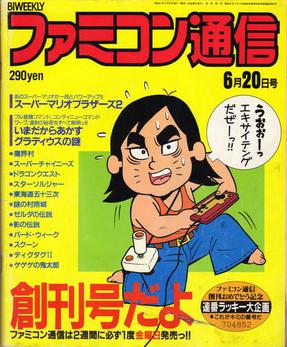
Famitsu, formerly Famicom Tsūshin, is a line of Japanese video game magazines published by Kadokawa Game Linkage, a subsidiary of Kadokawa. Famitsu is published in both weekly and monthly formats as well as in the form of special topical issues devoted to only one console, video game company, or other theme. Shūkan Famitsū, the original Famitsu publication, is considered the most widely read and respected video game news magazine in Japan. From October 28, 2011, the company began releasing the digital version of the magazine exclusively on BookWalker weekly.

Armadillo (アルマジロ) is a platform video game, published by IGS in 1991 for the Family Computer.

Punky Skunk is a side-scrolling action-platform video game developed by Ukiyotei and published by Visit in Japan on 1 November 1996 and by Jaleco in North America in 1998 for the PlayStation. It takes place on a set of island archipiélagos where the wolf Badler and his legion of mouse-like Chews are threatening to pollute the locations through industries and machinery. Players assume the role of the titular skunk in an attempt to overthrow Badler and his BB Brigade army with the help of his companions Nash and Kelly. Its gameplay mainly consists of platforming using a main three-button configuration.
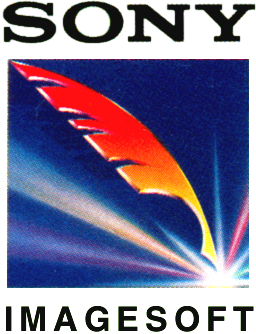
Sony Imagesoft Inc. was an American video game publisher that operated from 1989 to 1995 and was located in California. It was established in January 1989 in Los Angeles, California, as a subsidiary of the Japan-based CBS/Sony Group (CSG) and initially named CSG Imagesoft Inc. Their focus at the beginning was on marketing games exclusively for Nintendo consoles.
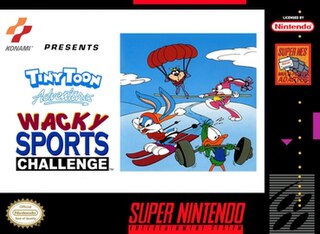
Tiny Toon Adventures: Wacky Sports Challenge is a sports video game. The game was released in 1994 for the Super Nintendo Entertainment System and developed and published by Konami. It is based on the American children’s television series, Tiny Toon Adventures. It is one of the few SNES games to feature an SNES Multitap as a useable controller.

Aicom was a Japanese video game developer, founded in 1988. The Sammy Corporation website gives 1990 as its first year and says it was a subsidiary of Jaleco. Sammy bought it in 1992.
Winkysoft was a Japanese video game developing company. They have made video games for console systems primarily for the Japanese video game market, as well as a handful of arcade games. On December 1, 2015, Winkysoft filed for bankruptcy.
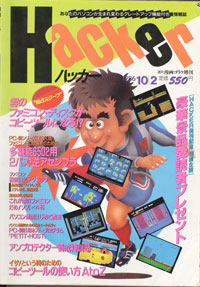
Hacker International was a Japanese video game company that developed and published games from 1990 to 2001 for the Nintendo Famicom, NEC PC Engine, Sony PlayStation consoles, and Microsoft Windows PCs. The company was known for its play-for-porn approach to gaming, with such games as AV Pachi-Slot and Soap Panic featuring female nudity as a reward for skilful playing. These games were usually distributed through mail order and sold approximately 30,000 to 50,000 copies each. Many of their games were developed by Taiwanese companies and were released in non-pornographic form elsewhere in the world; however, three were released in the United States for the Nintendo Entertainment System with pornography intact by another Taiwanese company, Panesian.

Prehistorik Man is a platforming video game for the Super Nintendo Entertainment System developed by Titus Interactive and published by Kemco in Japan in 1995 as P-Man and by Titus France elsewhere in 1996. It is a sequel to Prehistorik 2, featuring similar graphics but a richer and different story, and additional non-player characters which, among other things, provide hints and a tutorial.
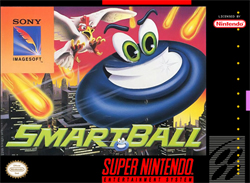
Smart Ball is a platform game developed by Game Freak and System Sacom. It was published by Epic/Sony Records and Sony Imagesoft for the Super Nintendo Entertainment System in 1991. A sequel titled Jerry Boy 2 was in production, but was not released.

Gon (ゴン) is a Japan-exclusive side-scrolling platform game for the Super Famicom published by Bandai in 1994. The game is an adaptation of the manga series Gon by Masashi Tanaka, about the daily life of a super-deformed orange Giganotosaurus dinosaur named Gon.

Satoru Nakajima F-1 Hero GB World Championship '91 is a 1991 Japan-exclusive Game Boy Formula One video game published by Varie, endorsed by Satoru Nakajima, who was the first full-time Japanese racer in the history of Formula One. Apart from Nakajima, the actual names of the drivers are not used due to licensing arrangements.

Football Fury is a Super NES video game that was released in 1992. The game's full Japanese name is Ultimate Football: Try Formation!.

Compati Hero is a video game series published in Japan by Banpresto and Bandai Namco Entertainment that began in 1990 and features 16 crossover teams between Ultraman, Kamen Rider and Gundam. Characters from other franchises have also been featured in some of the initial games, as well as in the Compati Sports series, such as Mazinger, Getter Robo, Devilman and Godzilla.
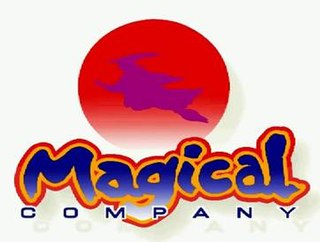
Magical Company ltd. (魔法株式会社), also known as Mahō, is a Japanese entertainment company.















